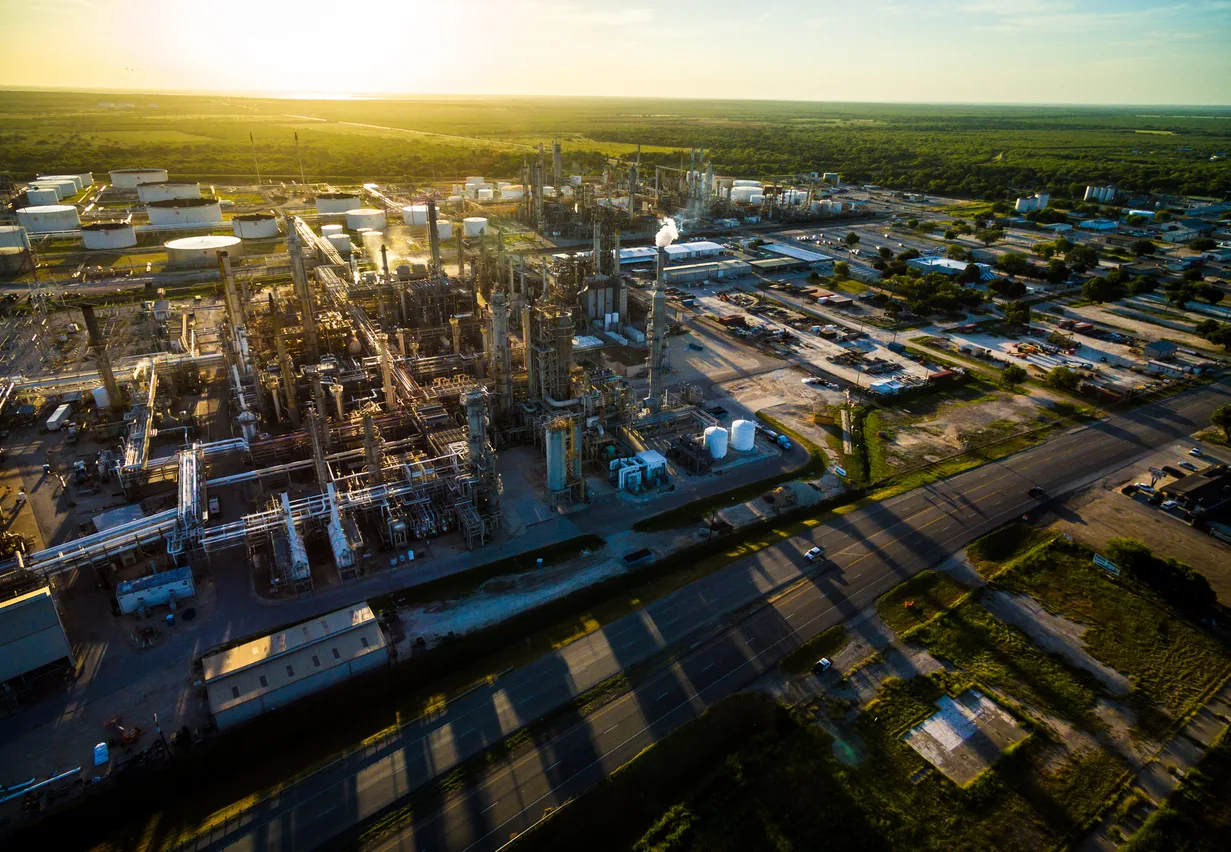
When you think of Texas, chances are that oil comes to mind — they call it “Texas tea,” after all. But the black gold pulled from the ground isn’t what ends up in your car or paves your roads. That transformation happens inside oil refineries: highly complex industrial sites where massive, pressurized machinery and volatile chemicals are essential to turning crude into gasoline, jet fuel, asphalt, and other petroleum products.
No state plays a bigger role in that process than Texas.
With more refineries than anywhere else in the country, the Lone Star State is the beating heart of America’s fuel production. But it’s also one of the deadliest places to work. Refinery jobs are among the most dangerous in the nation, where a single mistake—or a failure in safety protocols—can trigger catastrophic explosions, life-altering injuries, and tragic loss of life.
Read on to learn more about Texas refineries and how our undefeated Texas Plant & Refinery Explosion Lawyers stand up, fight, and win against the biggest oil and energy companies in the world.
The Scope of the Lone Star State’s Oil Refineries
Just how big is refining in the Lone Star State? You might say it’s as big as Texas. According to the U.S. Energy Information Administration (EIA), Texas is home to roughly 34 operating petroleum refineries.
While that number can fluctuate slightly, the combined processing power of these refineries in Texas is staggering. They account for over 30% of the total refining capacity in the entire country and are capable of processing well over 5.5 million barrels of crude oil every single day.
That enormous output plays a critical role not just for Texas but for meeting energy demands across the nation and even internationally.
List of Oil Refineries in Texas: Some of the Most Prominent Oil Producers
The scale of oil refineries can be difficult to imagine. To help make it a little more material, here are some of the major players among Texas oil refineries:
- Motiva Port Arthur Refinery: This isn’t just the largest refinery in Texas — it’s the largest in North America, with a production capacity of around 630,000 barrels per day (BPD)
- Marathon Galveston Bay Refinery: This giant is capable of processing nearly 600,000 BPD, becoming one of the largest refineries after Marathon joined together with BP’s Texas City facility
- ExxonMobil Baytown Complex: This facility’s capacity exceeds 560,000 BPD, making it one of the cornerstones of ExxonMobil’s operations
- Corpus Christi Complex (Valero and Others): The Corpus Christi area hosts multiple significant refineries operated by companies like Valero Energy and Flint Hills Resources, forming a major refining hub on the Gulf Coast (Valero alone operates multiple plants there)
As significant as these refineries are, this group is just scratching the surface, with other major facilities operated by companies like Valero (in Port Arthur), Phillips 66, TotalEnergies, and Chevron scattered across the state, particularly along the Gulf Coast.
What About the Workers? The Human Side of Oil Work
That high capacity doesn’t exist in a vacuum. The force behind it is the men and women who come to work at refineries every day and put their health and safety on the line.
Oil work carries significant risks.
Oilfields are complex industrial sites that handle volatile materials under high pressure and temperatures. While there are ways to operate them safely, one wrong move in production can cause fires, explosions, equipment malfunctions, and exposure to harmful chemicals like hydrogen sulfide or benzene.
Then there are the injuries that stem from industrial accidents: slips and falls, burns, and crush injuries, some of which could cause serious brain or spine damage or even death.
While regulatory bodies like OSHA and the Chemical Safety Board investigate serious incidents and push for stronger safety standards, the reality is that the thousands of refinery workers in Texas already know how dangerous their jobs are. They stay alert, follow protocols, and take their training seriously—because their lives often depend on it.
In our experience, most catastrophic refinery accidents aren’t caused by worker error. They happen because of major safety failures, corporate negligence, inadequate training, or companies cutting corners in the name of profits.
The Reality of “Texas Tea”
Oil refining is as far-reaching and complex as the geography it covers. On one hand, these facilities are true technological marvels and major contributors to the local economy and the nation’s energy infrastructure. But on the other hand, these refineries wouldn’t work without the human labor and courage that goes into keeping them humming day in and day out.
Contact the Undefeated Refinery Explosion Attorneys from Zehl & Associates Injury & Accident Lawyers for Help Today, Call 1-888-603-3636
With decades of experience and Billions won for injured workers and their families, our undefeated Texas Refinery Explosion Lawyers have seen firsthand the lengths oil and gas companies will go to avoid responsibility after a catastrophic accident. We never back down against the largest corporations in the world—and we won’t stop until our clients receive the full, record-setting compensation they deserve.
If you or a loved one were injured or tragically killed in a plant, refinery, oilfield, or pipeline accident or explosion, contact us today for a free consultation at 1-888-603-3636 or send us a confidential email through our Contact Us form.
For more information, please contact our undefeated refinery explosion attorneys in Texas at Zehl & Associates Injury & Accident Lawyers to schedule a free consultation today.
We proudly serve Harris County, Midland County, and throughout the state of Texas. We are located in Houston and Midland and throughout the state of Texas:
Zehl & Associates Injury & Accident Lawyers – Houston
2700 Post Oak Blvd #1000, Houston, TX 77056
(888) 603-3636
Open 24 hours

Zehl & Associates Injury & Accident Lawyers – Midland
306 W Wall St Suite 701, Midland, TX 79701
(432) 220-0000
Open 24 hours